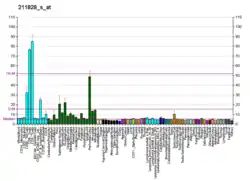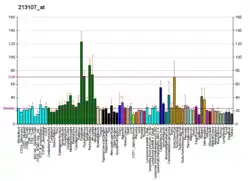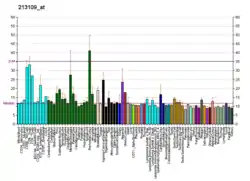TNIK
TRAF2 and NCK-interacting protein kinase is an enzyme that in humans is encoded by the TNIK gene.[5][6][7]
Function
Germinal center kinases (GCKs), such as TNIK, are characterized by an N-terminal kinase domain and a C-terminal GCK domain that serves a regulatory function.[6][7]
Interactions
TNIK has been shown to interact with KIAA0090,[8] although the significance is unclear. TNIK has been shown to phosphorylate Gelsolin, a protein involved in F-actin depolymerisation thus inducing cytoskeletal changes.[6]
References
- GRCh38: Ensembl release 89: ENSG00000154310 - Ensembl, May 2017
- GRCm38: Ensembl release 89: ENSMUSG00000027692 - Ensembl, May 2017
- "Human PubMed Reference:". National Center for Biotechnology Information, U.S. National Library of Medicine.
- "Mouse PubMed Reference:". National Center for Biotechnology Information, U.S. National Library of Medicine.
- Nagase T, Ishikawa K, Miyajima N, Tanaka A, Kotani H, Nomura N, Ohara O (Aug 1998). "Prediction of the coding sequences of unidentified human genes. IX. The complete sequences of 100 new cDNA clones from brain which can code for large proteins in vitro". DNA Res. 5 (1): 31–9. doi:10.1093/dnares/5.1.31. PMID 9628581.
- Fu CA, Shen M, Huang BC, Lasaga J, Payan DG, Luo Y (Nov 1999). "TNIK, a novel member of the germinal center kinase family that activates the c-Jun N-terminal kinase pathway and regulates the cytoskeleton". J Biol Chem. 274 (43): 30729–37. doi:10.1074/jbc.274.43.30729. PMID 10521462.
- "Entrez Gene: TNIK TRAF2 and NCK interacting kinase".
- Prieto C, De Las Rivas J (July 2006). "APID: Agile Protein Interaction DataAnalyzer". Nucleic Acids Res. 34 (Web Server issue): W298–302. doi:10.1093/nar/gkl128. PMC 1538863. PMID 16845013. Archived from the original on 2010-04-09.
Further reading
- Nakajima D, Okazaki N, Yamakawa H, et al. (2003). "Construction of expression-ready cDNA clones for KIAA genes: manual curation of 330 KIAA cDNA clones". DNA Res. 9 (3): 99–106. doi:10.1093/dnares/9.3.99. PMID 12168954.
- Yonekura H, Migita H, Sakurai S, et al. (1999). "Antisense display--a method for functional gene screening: evaluation in a cell-free system and isolation of angiogenesis-related genes". Nucleic Acids Res. 27 (13): 2591–600. doi:10.1093/nar/27.13.2591. PMC 148466. PMID 10373574.
- Strausberg RL, Feingold EA, Grouse LH, et al. (2003). "Generation and initial analysis of more than 15,000 full-length human and mouse cDNA sequences". Proc. Natl. Acad. Sci. U.S.A. 99 (26): 16899–903. doi:10.1073/pnas.242603899. PMC 139241. PMID 12477932.
- Brill LM, Salomon AR, Ficarro SB, et al. (2004). "Robust phosphoproteomic profiling of tyrosine phosphorylation sites from human T cells using immobilized metal affinity chromatography and tandem mass spectrometry". Anal. Chem. 76 (10): 2763–72. doi:10.1021/ac035352d. PMID 15144186.
- Taira K, Umikawa M, Takei K, et al. (2005). "The Traf2- and Nck-interacting kinase as a putative effector of Rap2 to regulate actin cytoskeleton". J. Biol. Chem. 279 (47): 49488–96. doi:10.1074/jbc.M406370200. PMID 15342639.
- Gerhard DS, Wagner L, Feingold EA, et al. (2004). "The status, quality, and expansion of the NIH full-length cDNA project: the Mammalian Gene Collection (MGC)". Genome Res. 14 (10B): 2121–7. doi:10.1101/gr.2596504. PMC 528928. PMID 15489334.
- Wissing J, Jänsch L, Nimtz M, et al. (2007). "Proteomics analysis of protein kinases by target class-selective prefractionation and tandem mass spectrometry". Mol. Cell. Proteomics. 6 (3): 537–47. doi:10.1074/mcp.T600062-MCP200. PMID 17192257.
This article is issued from Wikipedia. The text is licensed under Creative Commons - Attribution - Sharealike. Additional terms may apply for the media files.






